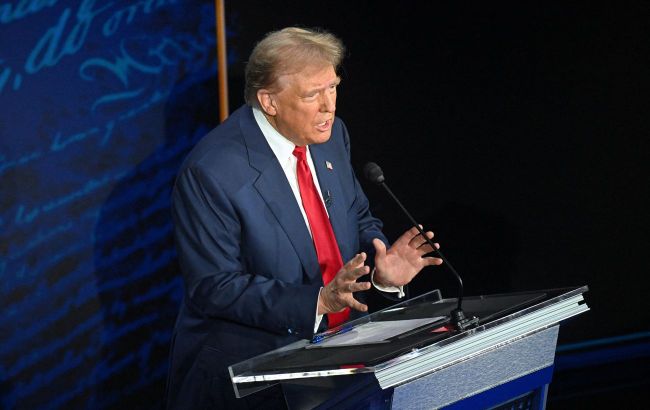Trump administration seeks to cut funding for UN and NATO - Washington Post
 Photo: Trump wants to stop funding the UN and NATO (Getty Images)
Photo: Trump wants to stop funding the UN and NATO (Getty Images)
The Trump administration has proposed cutting the budget of the US State Department and what remains of USAID by nearly half. Spending on humanitarian aid, global health, and international organizations would be slashed, according to The Washington Post.
The White House Office of Management and Budget’s memorandum for the next fiscal year proposes to leave $28.4 billion for all State Department activities. That’s $27 billion less than the funding Congress has approved for 2025.
The proposed budget, which is still being debated by the administration and, crucially, by Congress, would see USAID become a full part of the State Department. Humanitarian assistance would be cut by 54%, while global health funding would be slashed by 55%.
The cuts would be particularly sharp, with support for international organizations slashed by 90 percent. Funding for the United Nations, NATO, and 20 other organizations would be cut, the memorandum said.
However, contributions to several organizations, including the IAEA and the International Civil Aviation Organization, would remain. The memo also describes a complete cut in funding for international peacekeeping missions, citing recent mission failures without providing details.
Congressional approval needed
It is unclear whether such drastic cuts will win approval in the Republican-controlled Congress. President Donald Trump’s aggressive proposal to slash government spending and radically reduce civil servants, including through billionaire Elon Musk’s DOGE, which led to the dissolution of USAID, has faced fierce resistance in some Republican Party constituencies.
The proposed funding cuts coincide with Trump’s attempt to reorient the United States’ relations with the world, as Washington sharply abandons its history of membership in international organizations and using humanitarian aid to build and sustain alliances.
The department, led by Secretary of State Marco Rubio, a former US senator known for his advocacy of foreign engagement, is preparing its reduction plan that would cut tens of thousands of the department’s 80,000 employees and shutter numerous US consulates and facilities, officials familiar with the situation said. It is not yet clear how the State Department will close its overseas facilities.
In a statement issued after the memorandum was reviewed, the American Foreign Service Association urged Congress to reject any budget that proposed such cuts, calling the proposal "reckless and dangerous" and suggesting that it "would empower adversaries like China and Russia who are eager to fill the void left by a retreating United States".
Cuts plan
The memorandum outlines significant proposed changes for State Department employees, detailing pay and hiring freezes, cuts to benefits and travel for members of the diplomatic service, and consolidation of positions.
Some offices, such as the Bureau of Conflict and Stabilization Operations, which focuses on anticipating and preventing global conflict, will be closed. All educational and cultural programs administered by the State Department, including the Fulbright Program, which was established by Congress in 1946 and has led to educational exchanges involving more than 40 future heads of state and government, will be terminated.
"It is essentially the demolishing of our international influence instruments," said Brett Bruen, a former State Department and National Security Council official who served as director for global engagement in the Obama administration.
The memo is dated April 10. According to the memorandum, Rubio has until April 15 to respond to the proposal, including any desired changes.
The final budget proposal is expected to be presented to Congress in late April. Some aspects could face resistance from lawmakers, and some critics argue that the executive branch cannot shut down USAID, a government agency, without congressional approval.
"This is an unserious budget. I predict it will hit a wall of bipartisan opposition," said Sen. Chris Van Hollen (Maryland), the top Democrat on the Senate Foreign Relations Committee’s State Department and USAID subcommittee.
Withdrawing funding for UN and NATO
Richard Gowan, director of the UN International Crisis Group, said that while the cuts to international organizations were expected, there was some hope among UN officials that they would be limited because Trump had said the UN needed to focus on its top priority, peace and security.
A move to cut funding for the NATO military alliance through the State Department could also backfire. During his first term, Trump negotiated a reduction in the US share of NATO's budget, which is separate from the indirect military spending of each of the alliance's 32 members.
Julianne Smith, the U. ambassador to NATO under the Biden administration, said such a move could create "serious problems" within the alliance, as other countries would have to make up the shortfall. Or they could try to reduce their contributions to the general fund, which this year is set at about $5 billion.
The memo says the Trump administration’s budget proposal keeps funding for some programs popular with Congress, including $5.1 billion in foreign military grants to allies like Israel and Egypt and $2.9 billion for a global health program known as PEPFAR, or the President’s Emergency Plan for AIDS Relief.
On his first day in office, Jan. 20, Donald Trump ordered a freeze on all US foreign aid. This resulted in the shutdown of the US Agency for International Development (USAID) around the world and the disruption of humanitarian aid programs in other countries.

